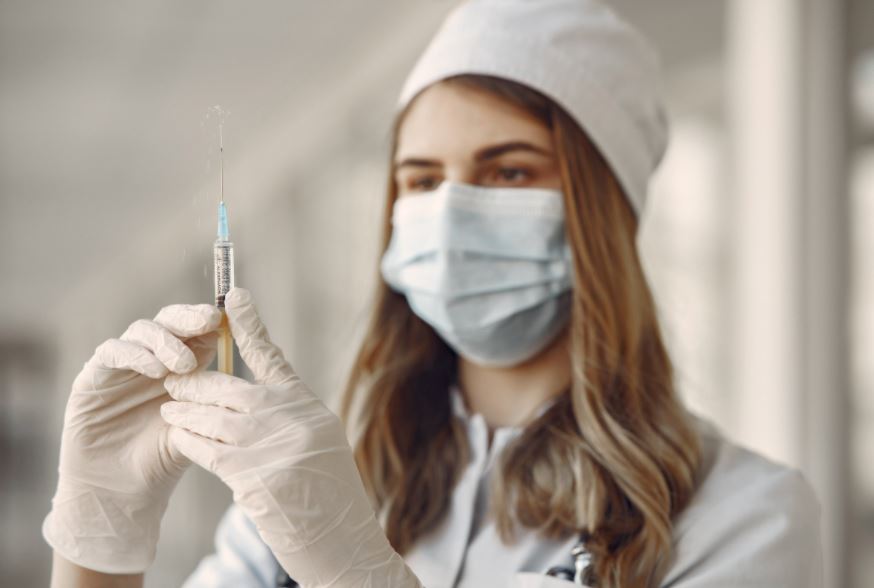
Two weeks remain for essential workers to apply for tuition-free college

|


|

FOR IMMEDIATE RELEASE
December 14, 2020
MDHHS Contact: Lynn Sutfin, 517-241-2112
MHA Contact: John Karasinski, 517-582-5097
LANSING, Mich. – Frontline health care workers at two Michigan hospitals today were the first people in the state to receive the safe and effective COVID-19 vaccine approved by the U.S. Food and Drug Administration and the U.S. Centers for Disease Control and Prevention.
The first COVID-19 vaccine, produced by Michigan-based Pfizer, and today’s initial vaccinations mark a historic milestone in the world’s unprecedented cooperative mission to control and end the COVID-19 pandemic. The vaccinations at Michigan Medicine and Spectrum Health Butterworth Hospital begin the journey toward the eventual safe full reopening of Michigan’s economy, schools and communities. Additional Michigan hospitals are expected to begin vaccinating health care staff later this week.
Gov. Gretchen Whitmer thanked the state’s hospital and other health care workers for “tireless dedication, bravery and strength” in caring for the tens of thousands of residents who have fought the virus – and for being first-in-line for vaccinations.
“This is a great day for our families, frontline workers, small businesses, and Michigan as a whole. Here, in the state built on innovation and grit, a safe and effective COVID vaccine is being manufactured by Michigan workers at a Michigan business,” Governor Whitmer said. “Our frontline essential hospital workers have gone above and beyond to save lives – including stepping up today to receive vaccines. And we have residents across the state doing their part to eradicate the virus and keep our communities safe. Remember: it will take some time for the vaccine to be widely distributed to everyone. That’s why it’s so important that we all do our part by masking up, practicing safe social distancing, and avoiding indoor gatherings where the virus can easily spread from person to person. This is a historic day in Michigan. We will get through this together.”
In the face of the most massive vaccination effort our world has ever seen, Dr. Joneigh Khaldun, chief medical executive and chief deputy for health with the Michigan Department of Health and Human Services, expressed her confidence in the first approved COVID-19 vaccine.
“The significant impact of COVID-19 has led to unprecedented, worldwide collaboration among scientists, medical doctors, health and government officials, and manufacturers,” Khaldun said. “The arrival of this vaccine in Michigan signals that the end of this pandemic is near. However, it will take several months before we are able to have enough vaccine to widely distribute it to the general population. Until then, and even for individuals who receive the vaccine, we should all be doing our part to slow the spread of this virus by wearing masks, avoiding large gatherings, and washing hands.”
Brian Peters, chief executive officer of the Michigan Health & Hospital Association, said the medical, support and executive teams at the state’s hospitals have been on the frontlines treating COVID-19 patients from the start of the pandemic and now “stand proud and grateful to lead the state’s public health and economic recovery from a virus that has devastated far too many lives, families, businesses and communities.”
“As vaccinations start today with the health care heroes at hospitals statewide, Michigan is now on course to move out of the darkness of pandemic to economic and public health recovery,” Peters said.
In the coming days and weeks, vaccine doses will arrive at additional Michigan hospitals and other medical centers across the state. The first Michigan citizens to be vaccinated will be priority hospital and health care workers, and staff and residents of long-term care facilities.
Even with COVID-19 vaccinations starting in Michigan and worldwide, doctors urge everyone to continue to practice preventative measures such as properly wearing masks, social distancing and frequent handwashing to reduce the spread of the virus until the vast majority of people have been vaccinated.
People with questions about vaccines – including the COVID-19 vaccines – should consult a credible source with answers based on medical science. Sources for vaccine information based entirely on medical science include IVaccinate.org, the Michigan Department of Health and Human Services, and the CDC. A comprehensive set of questions and answers about COVID-19 can be found at Michigan.gov/COVIDVaccine.
Michigan’s COVID-19 Vaccinations Begin: Video/Photos for Media
We will provide regular vaccination updates throughout the week to Michigan media, including photos and video of COVID-19 vaccinations being administered at hospitals across the state. Below are details about some of the first to be vaccinated today. Over the next two days, vaccines are expected to arrive and be administered at additional hospitals. Information will also be posted at MICareMatters.org.
Spectrum Health Butterworth Hospital
Who: Marc McClelland, pulmonary and critical care physician, 46, Ada, Michigan
When: Vaccinated at 12:04 p.m.
Photo/video: Available upon request
Quote: “To me this is a day of hope.”
Media contact: Beth Cranson, 616-540-0813, [email protected]
Michigan Medicine
COVID-19 vaccines started arriving and being administered today at Michigan Medicine. Pictured are Dr. Joneigh S. Khaldun, Chief Medical Executive and Chief Deputy Director for Health for the Michigan Department of Health and Human Services alongside University of Michigan President Dr. Mark S. Schlissel.

December 14, 2020
Contact: Lynda Robinson, 313-348-8220
The Michigan Unemployment Insurance Agency (UIA) today advised workers that unless Congress takes action, federal unemployment insurance (UI) programs provided under the federal Coronavirus Aid, Relief, and Economic Security (CARES) Act will end on December 26, 2020.
The UIA estimates that the unemployment benefits of nearly 692,000 Michigan workers may be affected unless Congress acts swiftly to extend UI provisions under CARES. The federal legislation expanded UI to provide Pandemic Unemployment Assistance (PUA) to many workers impacted by the COVID-19 pandemic, including workers who are not ordinarily eligible for unemployment benefits, such as self-employed, independent contractors and gig economy workers. CARES also provided Pandemic Emergency Unemployment Compensation (PEUC) which allowed an additional 13 weeks of benefits to those who exhausted their regular state claim and federal reimbursements for Work Share benefits.
Claimants receiving benefits under PUA (487,000 workers) or PEUC (205,000 workers) programs who have not exhausted all of their eligible benefit weeks, will not be paid benefits for any weeks after December 26.
“We’re hopeful that Congress will take action to protect access to critical unemployment assistance for Michigan workers whose jobs have been affected by COVID-19,” said UIA Acting Director Liza Estlund Olson. “Allowing these programs to expire is not only harmful to Michigan workers, but it would be devastating to Michigan’s economy.”
Michigan’s average weekly unemployment benefit is currently estimated at $319. The expiration of around 700,000 unemployment claims could result in over $220M that would not go into workers’ pockets or the state’s economy each week.
There is currently legislation pending in the State Legislature that would continue certain unemployment expansions but is unrelated to the CARES programs. The UIA is hopeful new state legislation will be passed this week.
If additional state or federal legislation is passed, updates about new or extended unemployment benefit programs will be posted on the UIA website at Michigan.gov/UIA.
Other state assistance programs are available for Michiganders who need assistance with making ends meet. Through the Michigan Department of Health and Humans Services MI Bridges program, claimants can apply for healthcare coverage, food and cash assistance, and more. MI Bridges also list helpful state and local resources.
Resources for jobseekers, including, training, workshops, access to job fairs and more are available through local Michigan Works! service centers. Call 800-285-WORKS or visit MichiganWorks.org.


Press Release
FOR IMMEDIATE RELEASE: Dec. 15, 2020
CONTACT: Bob Wheaton, 517-241-2112, wheatonb@
New online tool allows Michiganders to learn their risk of COVID-19
MDHHS Aging & Adult Services launches service with older adults in mind
LANSING, Mich. – The Aging and Adult Services Agency at the Michigan Department of Health and Human Services (MDHHS) has announced the launch of CV19 CheckUp in Michigan – a free, anonymous, personalized online tool that evaluates someone’s risks associated with COVID-19
The service is in partnership with BellAge, Inc. and can be used by going to Michigan.CV19Checkup.org.
“This tool, which we will make available to all Michiganders, helps individuals understand their risk based on their life situation and personal behavior, and offers recommendations to reduce those risks while also connecting people to services if needed,” said Dr. Alexis Travis, senior deputy director of the Aging & Adult Services Agency. “And while this tool is available to all residents, it is specifically designed with older adults – age 60 and over – in mind. Older Michiganders represent 24 percent of confirmed COVID-19 cases and 89 percent of confirmed deaths. We are dedicated to keeping aging adults safe and healthy and believe this tool will help older adults stay safer and healthier as cases continue to grow.”
BellAge developed the tool to help people be safer and healthier, and ensure their individual needs are met during the pandemic. CV19 CheckUp fills a critical need for a comprehensive resource that educates, advises and empowers people to protect themselves from COVID-19.
CV19 CheckUp uses artificial intelligence to analyze data each person provides by completing an online questionnaire. It is designed for those who are considered high risk, including older adults, low-income people, ethnic and racial minorities, and LGBTQ communities. The tool’s algorithms are driven by science and medicine, using data from the U.S. Centers for Disease Control and Prevention (CDC) and the World Health Organization (WHO). It is anonymous and does not require a name, email address or identifier of any type.
Upon completion of the anonymous questionnaire, CV19 CheckUp immediately delivers a personalized report. The report answers questions such as:
The individualized approach that defines CV19 CheckUp delivers much-needed support to those who are hardest hit by COVID-19, including the more than 2.4 million Michiganders age 60 and older, as well as those with underlying health conditions and/or compromised immune systems. The CDC has described these people as being at higher risk of severe or fatal consequences if they are infected with COVID-19.
CV19 CheckUp is easy to use and assesses each person’s unique situation, presenting options to help reduce risk and enhance quality of life.
“CV19 CheckUp was developed to fill an urgent public need,” said Jim Firman, chief innovation officer, BellAge, Inc. “Our team realized that although there are many resources with information about the virus, all of them require a lot of effort by the user. The average person has to spend considerable time on numerous websites, digging through pages of information looking for answers that are relevant to their specific situation. CV19 CheckUp does the work for them. We developed a hyper-personalized tool that makes it easy for anyone to understand their level of risk and take steps to reduce those risks.”
In addition, through CV19 CheckUp, governments and health organizations also receive data that helps facilitate developing methods to target populations that are at high risk for COVID-19. Data are completely anonymous, and findings can be used to gain insights on:
This project is funded in part by the Michigan Health Endowment Fund.

Covering all 22 OAA teams with insight and thoughts on each team from Northern Oakland County to Southern Oakland County.
Written Monday December 14th at 2:00 PM
Why everyone making the playoffs is a good thing.
In other sports everyone makes the playoffs. In football it was done this season because of the coronavirus pandemic.
Could this be the norm???
This pandemic playoff format where everyone makes the playoffs has been a success. This is something that the MHSAA Executive Director Mark Uyl and the MHSAA Representative Council need to seriously look at.
You had some great and intriguing matchups in the postseason that no one would had thought off like Lake Orion/Grand Blanc, West Bloomfield/Sterling Heights Stevenson, Stoney Creek/Chippewa Valley etc.
Oak Park would have not made the playoffs under the old format which is based on strength of schedule and playoff points. In 2019, you needed six wins to make the playoffs. The Knights went 0-6 this season but right now they would be still playing if not for this pause.
How it would work is that everyone plays eight games and expand the playoffs like this year. It would create very interesting storylines.
There are coaches and some fans that are against this model because it rewards bad teams and that everyone makes the postseason. On the flip side if you have played a brutal schedule and don’t have a winning record and you see a team that has an easier schedule make the playoffs then you’ll be up at arms.
OAA 2017 rings that bell.
As a former player and current blogger and podcaster I think this is an awesome format to look at in the future and it creates surprising matchups and teams like we have seen in this postseason.
The pandemic playoff format tells where several schools particularly in the OAA have to be in the conversation.
We know about West Bloomfield, Lake Orion, Clarkston, Oxford, Adams, Oak Park, Southfield Arts and Tech, Groves, Seaholm, North Farmington, Farmington, and Stoney Creek. They have been there and done that. They have won State titles or have had deep playoff runs but there are several schools that have been underachieving programs that could use this experience to reshape their brand.
For teams that were in the Blue this season, it pretty much tells the whole story.
Rochester was the division champ going unbeaten for the first time since 1991 but they were blown out by Adams. Avondale lost to Groves. Troy Athens was blown out by Southfield Arts and Tech. Those three schools lost to OAA schools that were either in the Red or in the White which of course is much tougher competition all in the first round. Ferndale lost to Detroit Renaissance which I’ll mention below about them because their problem seems to be out of league. Pontiac was blown out which I also mention below. Troy and Berkley both won their first round games over Bloomfield Hills and Royal Oak respectably but were blown out by West Bloomfield and Warren Mott in the district semifinals.
Ferndale is the perfect example of a program needing this pandemic playoff format. The Eagles have the smallest enrollment in the OAA but they have a Co-Op program with Ferndale University which puts them in Division Two for the postseason. My biggest issue with Ferndale is that the Eagles have proven they are a league contender in the Blue but it’s when they go out of the OAA and face bigger schools like Detroit Renaissance this is where they struggle. This is something that Coach Eric Royal needs to address this offseason, it’s not the in league but the out of league they need to address.
I was very happy for Pontiac and their student athletes. A football program that has had a very difficult nine years (5-72 since.) Let’s be fair the Phoenix are the only Division Three school in the OAA. For them to experience what it’s like in the postseason is a huge accomplishment. Pontiac had to go to Bay City and got blown out 64-0 by Bay City Central in the first round. The league seriously need to help Pontiac big time especially with what they have been going through maybe give them some open dates not have them go through that gauntlet. I wrote a separate column surrounding this issue.
Should teams be rewarded for the tough schedules they play sure but it’s up to those teams as mentioned in the Blue that need to step up and show results.
At the end of the day this pandemic format gave everyone a chance to play. Should the MHSAA and the Representative Council make this permanent it would be very interesting. It could create a Cinderella story and it gives teams a fresh start from the regular season and into the postseason.
Posted by Saginaw Bay at 10:50 AM